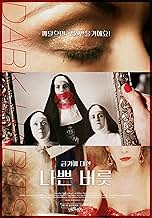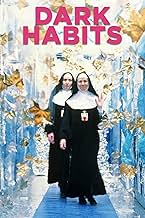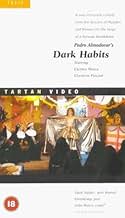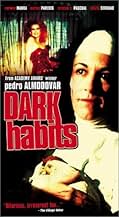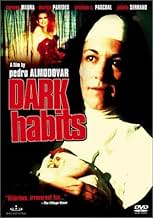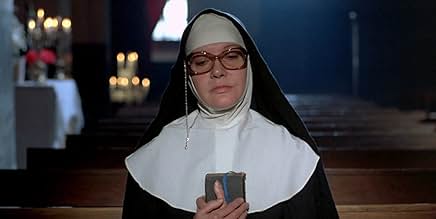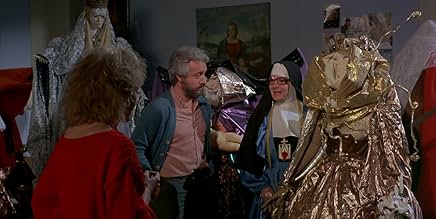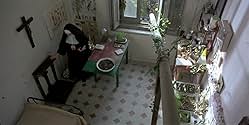IMDb RATING
6.5/10
8.9K
YOUR RATING
A nightclub singer seeks refuge with gay nuns on dope in a Madrid convent.A nightclub singer seeks refuge with gay nuns on dope in a Madrid convent.A nightclub singer seeks refuge with gay nuns on dope in a Madrid convent.
- Awards
- 1 win & 1 nomination total
Cristina Sánchez Pascual
- Yolanda
- (as Cristina S. Pascual)
Miguel Zúñiga
- Madero
- (as Miguel Zuñiga)
Mary Carrillo
- Marquesa
- (as Mari Carrillo)
Rubén Tobías
- Policía
- (as Ruben Tobias)
Concha Grégori
- Sofia
- (as Concha Gregori)
Ángel Sánchez Harguindey
- Periodista
- (as Angel S. Harguindey)
- Director
- Writer
- All cast & crew
- Production, box office & more at IMDbPro
Featured reviews
This film made after Almodovar's first more upbeat outrageous films, is a film that tells of the end of the Movida Madrilenia, a movement existing in the early eighties in Madrid that was defined by a mixture of new romantic punk and pop, and the ironic use of Spanish folklore and the 'housewife' culture. When people in this subculture started to commonly use heroine, the downfall of the movement had begun. This film is about the choices that people had to make at the end of this era. some stayed junkies, others died, some went back to the small towns where they had moved from, others went on to give up on drugs and become more constructive. The convent where the nuns reside can be interpreted as the habitation of this irreverent movement, frequented by police searches, dealers, artists, and junkies. The movie has some great musical moments which indicate that Almodovar might one day take his hand to this genre. The religious element interwtined with (homo)sexuality will certainly be proliferated again in the forthcoming movie La Mala Educacion. The movie also contains a cameo of a Spanish 'Harrold Robbins' type of writer, who is featured sitting at one of the tables wiping her mouth with a handkerchief as Yolanda sings in a night club at the beginning of the movie. This authopr refers to the character of sister Rata de Callejon, who has a secret career as trashy novel writer. The film is somewhat darker than most of Almodovar's early movies, but is very gentle, provides enough comedy and the characters above all remain very human, all of them have their virtues and vices.
Maybe the one line summary is wrong, that's the problem with Pedro Almodovar's flick, you don't know what its supposed to be: ironic, satire, parody, black comedy or a serious drama. It's got a lounge singer hiding out in a convent (remember this is a 1983 movie, made way before Sister Act) after her lover ODs. The nuns are former losers, street trash, etc. who are given punishable names like Sister Rat-in-the-Sewer or Sister-Damned and their Mother Superior shoots up heroin. Are they making fun of Catholics or what? Nevertheless, this is a bit funny, while being a little boring. Recommended to the Almodovar/Spanish/foreign fans who shouldn't expect this one to be better than his usual films.
"Entre tinieblas": "In the Dark" maybe "Wondering about", "Somebody that has lost his/her way" would be the closest translation to the Spanish title.
"Dark Habits" is so parochial, so banal, that changes completely the message of this movie.
I just saw it today, out of nostalgia, since I own a copy, but very seldom I see a movie more than once.
Throughout the years I've seen this one three times! Every time it excels the last view. It isn't the best Almodovar. At the time he didn't have the money (and therefore the incredible terseness of his more recent filmography) nor the experience to make a work of art of every single frame, as he has accustomed us during the last several years. But this films grabs you from the very beginning with such guts that it's impossible to point out its formula.
It's simply magic.
Cristina Sánchez Pascual is not Greta Garbo, but again, like the movie itself, she has "something" in her personality that mesmerizes you whenever she's on the screen.
The way Chus Lampreave ("Sor Rata de Callejón" or "Sister Rat of the Back Alley") delivers her lines is comparable to the way Carol Channing or Eartha Kitt used to delivered theirs: Sheer pleasure to the ears and the brain.
I don't know how it could sound to somebody that needs to read the translation, but for a Spanish speaking person this woman is unique. She could read the telephone book and make it irresistibly funny.
The character of the Marquess (Mary Carrillo) is Almodovar 100%, when she comments to the Abbess Julia: "I'm a cosmetician", "¿Really?", "Of course, see my face?" and she shows an incredibly clownish face that only an inebriated cosmetician would have done.
And the Bolero that Lucho Gatica sings --"Encadenados" "Chained Together"-- is simply so gorgeous that one could melt on the spot out of utter delight, I swear. (I have to find it on "You Tube"!!).
This movie doesn't deserve 8 points, I simply gave it 8 points in my vote because of its masterly ways to grab one's imagination with not too many resources. I adore this movie. It's imperfect, the photography is not very good, the acting leaves a lot to be desired, the sets are in general quite poor..., the script...MMM-mmm, but the movie is sublime!!
"Dark Habits" is so parochial, so banal, that changes completely the message of this movie.
I just saw it today, out of nostalgia, since I own a copy, but very seldom I see a movie more than once.
Throughout the years I've seen this one three times! Every time it excels the last view. It isn't the best Almodovar. At the time he didn't have the money (and therefore the incredible terseness of his more recent filmography) nor the experience to make a work of art of every single frame, as he has accustomed us during the last several years. But this films grabs you from the very beginning with such guts that it's impossible to point out its formula.
It's simply magic.
Cristina Sánchez Pascual is not Greta Garbo, but again, like the movie itself, she has "something" in her personality that mesmerizes you whenever she's on the screen.
The way Chus Lampreave ("Sor Rata de Callejón" or "Sister Rat of the Back Alley") delivers her lines is comparable to the way Carol Channing or Eartha Kitt used to delivered theirs: Sheer pleasure to the ears and the brain.
I don't know how it could sound to somebody that needs to read the translation, but for a Spanish speaking person this woman is unique. She could read the telephone book and make it irresistibly funny.
The character of the Marquess (Mary Carrillo) is Almodovar 100%, when she comments to the Abbess Julia: "I'm a cosmetician", "¿Really?", "Of course, see my face?" and she shows an incredibly clownish face that only an inebriated cosmetician would have done.
And the Bolero that Lucho Gatica sings --"Encadenados" "Chained Together"-- is simply so gorgeous that one could melt on the spot out of utter delight, I swear. (I have to find it on "You Tube"!!).
This movie doesn't deserve 8 points, I simply gave it 8 points in my vote because of its masterly ways to grab one's imagination with not too many resources. I adore this movie. It's imperfect, the photography is not very good, the acting leaves a lot to be desired, the sets are in general quite poor..., the script...MMM-mmm, but the movie is sublime!!
This is early Almodovar, and if you've seen his other early films, you know what to expect. If you haven't seen them, then you might be surprised. The film is funny, unpredictable, and endearing in a kinky, warped kind of way. Almodovar's nuns are wonderful characters. With straight faces and looks of piety, they do outrageous things without batting an eye. There are probably many ways to interpret the film, but I think it's about acceptance. We're all "sinners" in one way or another, as the nuns would say, and it's not up to us to judge or condemn other people. The sisters are very forgiving - in fact, they love sinners! - and they create a little haven where marginal people can find shelter. They are eccentric, they do things that mainstream society condemns, but they don't really do any harm to anyone and maybe even help some people find their path in life. This isn't the Catholic Church's idea of what a convent should be like, and I understand that very devout people would be offended by the way Almodóvar treats the subject. Still, he does it in a kind of gentle, good humored way and he offers an alternative vision of religious devotion that can make you laugh if you aren't too uptight about these things. Things don't always make sense, but that's fine, things don't make sense in life sometimes, either. Just sit back and watch, and enjoy the twists and turns.
It's not very often that you can go back this far in a director's career and find a film this good.
It's sure as hell not sentimental; it's a black comedy - you've got parody, satire and a dark-humour rolled into one.
There already signs of Almodóvar's skill at film-making, already touches of Almodóvar's trademark whit and humour. It starts out with a girl at a crossroads in her life: on the one hand, a drug fuelled crazy future the other, the stability of a convent. Or is that the other way round? For those familiar with Almodóvar's films, there are some of the reoccurring themes you'd expect to find, amongst others: prostitution, nuns, drugs, and dealers. More specifically, Dark Habits seems to deal with (to me anyway) a novelist (Almodóvar's film's often touch on creativity/ those involved), the idea of what is good, and along a similar vain, our abilities to turn a new leaf.
Obviously being in subtitles is going to exclude this for some, but others are whole-heartedly recommended; even if it isn't the best Almodóvar film, I've found it the most enjoyable so far. (I haven't heard a quote better than "I'm Sister Rat of the Sewers. I was keen to meet you" recently.)
Oh, and look out for the tiger ;-)
It's sure as hell not sentimental; it's a black comedy - you've got parody, satire and a dark-humour rolled into one.
There already signs of Almodóvar's skill at film-making, already touches of Almodóvar's trademark whit and humour. It starts out with a girl at a crossroads in her life: on the one hand, a drug fuelled crazy future the other, the stability of a convent. Or is that the other way round? For those familiar with Almodóvar's films, there are some of the reoccurring themes you'd expect to find, amongst others: prostitution, nuns, drugs, and dealers. More specifically, Dark Habits seems to deal with (to me anyway) a novelist (Almodóvar's film's often touch on creativity/ those involved), the idea of what is good, and along a similar vain, our abilities to turn a new leaf.
Obviously being in subtitles is going to exclude this for some, but others are whole-heartedly recommended; even if it isn't the best Almodóvar film, I've found it the most enjoyable so far. (I haven't heard a quote better than "I'm Sister Rat of the Sewers. I was keen to meet you" recently.)
Oh, and look out for the tiger ;-)
Did you know
- TriviaPedro Almodóvar's first film to have a proper producer and be made for a proper film company, rather than be made on the hoof like his previous projects. Almodóvar has since distanced himself from the film as he felt that he had to bow to commercial considerations.
- GoofsThe "Salí porque salí" song is obviously not sung by Yolanda nor the backing vocalists.
- ConnectionsReferenced in El Coleta & Jarfaiter: El Piko 3 (2014)
- SoundtracksSalí porque salí
Written by J. Curiel Alonso
Arranged by Miguel Morales
Performed by Sol Pilas
Edited by Música Latina N.Y. (USA)
- How long is Dark Habits?Powered by Alexa
Details
- Release date
- Country of origin
- Language
- Also known as
- Entre tinieblas
- Filming locations
- Production company
- See more company credits at IMDbPro
- Runtime1 hour 54 minutes
- Sound mix
- Aspect ratio
- 1.66 : 1
Contribute to this page
Suggest an edit or add missing content


![Watch Tráiler [VO]](https://m.media-amazon.com/images/M/MV5BZTI5ZGZmNGEtZmM0Mi00ZmUxLWI0ZGMtMmZmODQ0NDQzMTY5XkEyXkFqcGdeQXRyYW5zY29kZS13b3JrZmxvdw@@._V1_QL75_UX500_CR0)
